高一英语能力训练18
高一英语教学计划 高一英语教学工作计划(优秀18篇)
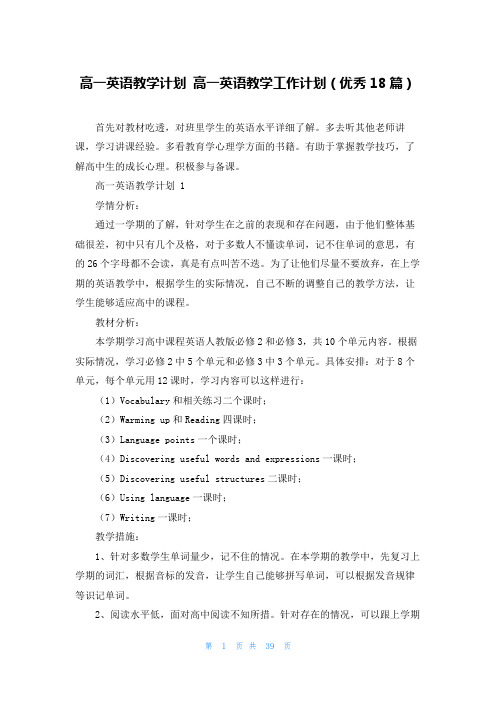
高一英语教学计划高一英语教学工作计划(优秀18篇)首先对教材吃透,对班里学生的英语水平详细了解。
多去听其他老师讲课,学习讲课经验。
多看教育学心理学方面的书籍。
有助于掌握教学技巧,了解高中生的成长心理。
积极参与备课。
高一英语教学计划 1学情分析:通过一学期的了解,针对学生在之前的表现和存在问题,由于他们整体基础很差,初中只有几个及格,对于多数人不懂读单词,记不住单词的意思,有的26个字母都不会读,真是有点叫苦不迭。
为了让他们尽量不要放弃,在上学期的英语教学中,根据学生的实际情况,自己不断的调整自己的教学方法,让学生能够适应高中的课程。
教材分析:本学期学习高中课程英语人教版必修2和必修3,共10个单元内容。
根据实际情况,学习必修2中5个单元和必修3中3个单元。
具体安排:对于8个单元,每个单元用12课时,学习内容可以这样进行:(1)Vocabulary和相关练习二个课时;(2)Warming up和Reading四课时;(3)Language points一个课时;(4)Discovering useful words and expressions一课时;(5)Discovering useful structures二课时;(6)Using language一课时;(7)Writing一课时;教学措施:1、针对多数学生单词量少,记不住的情况。
在本学期的教学中,先复习上学期的词汇,根据音标的发音,让学生自己能够拼写单词,可以根据发音规律等识记单词。
2、阅读水平低,面对高中阅读不知所措。
针对存在的情况,可以跟上学期一样做初中阅读,根据部分学生的理解情况,可以再选择高中阅读中易于理解的一些阅读,让他们慢慢适应高中阅读,逐步提高自己的阅读能力。
3、写作几乎成为这些学生最头疼的问题。
因为他们词汇量少,在语法方面不足,不懂得自己组织语言去表达其意思,所以就出现作文空白的现象。
通过平时在英语学习中用心的学生,他们也同样对写作无奈。
两案三库-同步教案-高一牛津-第18周02(期末总复习一))

只能跟动名词作宾语的动词:
, admit, appreciate, mind, suggest, consider, avoid, excuse, delay, finish, imagine, deny, enjoy, keep, practise, escape, risk , miss, can’t help, feel like, give up , put off
教 师
学 生
凌梓阳
上课时间
2017/6/1
学 科
英语
年 级
高一(下)
课题名称
期末综合复习一
教学目标
复习高一下U1-U3重点词汇短语、句型、语法;综合能力题型提升。
重点难点
查漏补缺,灵活运用所学知识点,提升解题能力
期末综合复习一
一、重点词组复习
Unit one The phantom of the opera
Spend some time+(in) doing sth
Lose no time +(in) doing sth
Have difficulty/ trouble sth
Be busy + (in) doing sth
Do you mind my/me using your computer?
His (不可用Him) smoking made his family angry.
相对论加入一起鼓掌
with a growing reputation / It is a pleasure to drive a genius / Einstein’s theory of relativity / join in the applause
高一英语备考学习方法指导

高一英语备考学习方法指导高一英语备考学习方法指导第一篇(一)听力能力是重点从如今社会环境要求方面看,听、说能力的高低是一个人英语水平高低的表现形式,与人交往离不开听、说的能力,因此重视听的能力是首要任务,听得懂才能说得出。
每天应坚持听的练习20—30分钟,必定会有收获。
(二)听力能力的训练方法模仿磁带,留意发音,学习精确的语音、语调,力求发音标准、美丽。
课本录音带及其它相关有声材料都是很好的训练材料。
坚持精听和泛听相结合。
精听是指使用有材料的听力训练。
可采取先听后看的方法,即在阅读听力材料之前先听2—3遍,再翻开材料边听边读,对已知和未知的内容有了肯定了解,然后再合上书,边听边理解,直到全部材料都能听懂并跟上它的速度。
泛听是指抽空随便地听,可以是无材料可循的内容。
如收听英语广播,甚至在平常收看外国影片时也能学习英语,训练听的能力。
听的训练是在坚持不懈的努力中,循序渐进的,既不行操之过急,也不能只想不干。
听力时间的保证也是提高听力能力所必需的。
高一英语备考学习方法指导第二篇尽快适应环境、适应高中学习方法。
课前仔细做好预习工作。
因为课时紧,内容多,强度大。
不仔细预习,课上会很被动。
预习要做到仔细听录音,模仿,把握精确的语音、语调,了解单词意思,课文内容,找出疑难问题。
课上仔细听讲,主动参与课堂活动,给自己更多的机会锻炼听、说能力,仔细适当地记笔记。
高效率听课,才能有高水平的收获。
课后要准时仔细复习,按时完成作业是首要的。
复习是为了稳固课堂学问,同时也应适当地做一些练习。
遇到没有理解的内容应准时问老师,使问题尽快解决。
要有适应新环境的能力,同时应有承受压力的能力。
要会调整自己,信任大家会以饱满的精神状态,充分的心理预备,顺利适应高中英语学习。
高一英语备考学习方法指导第三篇有人认为高考成果高就行了,不练说也没关系。
其实我们如今学习英语已不仅仅是为高考了,而是要为高考后的生存与进展做预备,也为个人与社会大环境接轨打基础。
高一英语口语表达能力训练单选题20题

高一英语口语表达能力训练单选题20题1. —Hello! Nice to see you.A. Hello! Nice to see you, too.B. Hi! Glad to meet you.C. Good morning! Have a nice day.D. Bye! See you later.答案:A。
本题考查日常问候语的回应。
A 选项是对“Nice to see you.”的标准回应;B 选项“Glad to meet you.”通常用于初次见面;C 选项“Good morning!”是早上的问候语,与题干不符;D 选项“Bye!”是告别语,也不符合题意。
2. —This is my friend, Tom.A. How are you?B. Nice to meet you.C. See you later.D. What's your name?答案:B。
当别人介绍朋友时,通常用“Nice to meet you.”来回应;A 选项“How are you?”是询问身体状况;C 选项“See you later.”是告别语;D 选项“What's your name?”是询问对方名字。
3. —Could you please pass me the book?A. No, I can't.B. Sure. Here you are.C. I don't know.D. Why not?答案:B。
对于请求,通常用“Sure.”或“Sorry, I can't.”来回应。
A 选项太直接且不礼貌;C 选项没有回应请求;D 选项“Why not?”是询问原因,不是对请求的回应。
4. —I'm sorry I'm late.A. It doesn't matter.B. You're welcome.C. That's right.D. No problem.答案:A。
高一英语听力训练
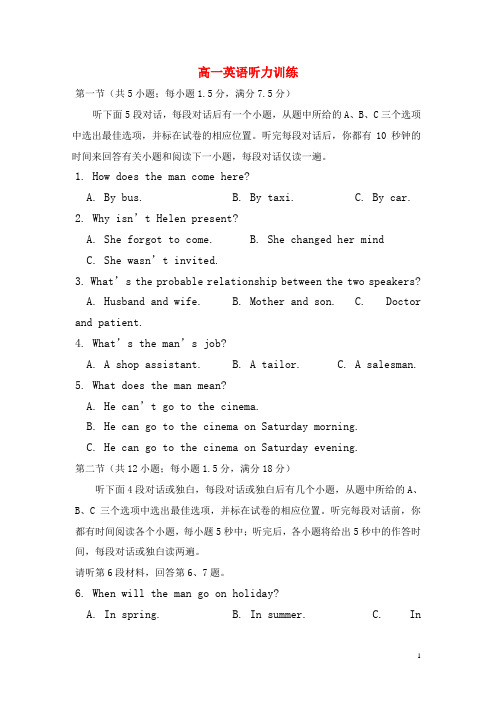
高一英语听力训练第一节(共5小题;每小题1.5分,满分7.5分)听下面5段对话,每段对话后有一个小题,从题中所给的A、B、C三个选项中选出最佳选项,并标在试卷的相应位置。
听完每段对话后,你都有10秒钟的时间来回答有关小题和阅读下一小题,每段对话仅读一遍。
1. How does the man come here?A. By bus.B. By taxi.C. By car.2. Why isn’t Helen present?A. She forgot to come.B. She changed her mindC. She wasn’t invited.3. What’s the probable relationship between the two speakers?A. Husband and wife.B. Mother and son.C. Doctor and patient.4. What’s the man’s job?A. A shop assistant.B. A tailor.C. A salesman.5. What does the man mean?A. He can’t go to the cinema.B. He can go to the cinema on Saturday morning.C. He can go to the cinema on Saturday evening.第二节(共12小题;每小题1.5分,满分18分)听下面4段对话或独白,每段对话或独白后有几个小题,从题中所给的A、B、C三个选项中选出最佳选项,并标在试卷的相应位置。
听完每段对话前,你都有时间阅读各个小题,每小题5秒中;听完后,各小题将给出5秒中的作答时间,每段对话或独白读两遍。
请听第6段材料,回答第6、7题。
6. When will the man go on holiday?A. In spring.B. In summer.C. Inwinter.7. Where is the man going?A. Switzerland.B. Italy.C. Austria.请听第7段材料,回答第8至10题。
高一英语被动语态专题训练答案
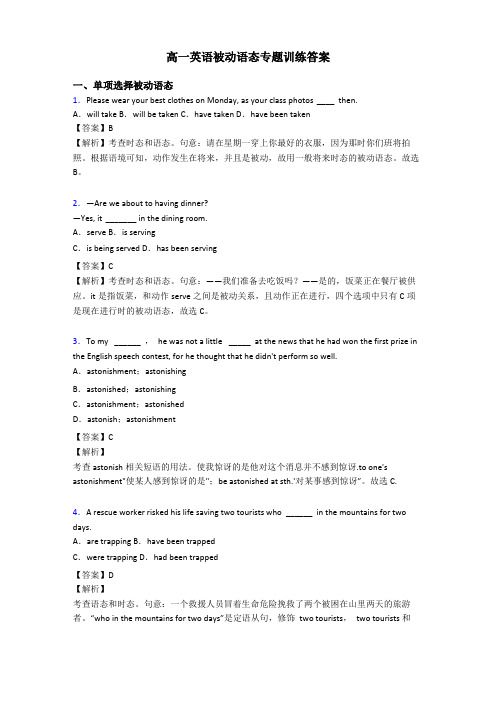
高一英语被动语态专题训练答案一、单项选择被动语态1.Please wear your best clothes on Monday, as your class photos ____ then.A.will take B.will be taken C.have taken D.have been taken【答案】B【解析】考查时态和语态。
句意:请在星期一穿上你最好的衣服,因为那时你们班将拍照。
根据语境可知,动作发生在将来,并且是被动,故用一般将来时态的被动语态。
故选B。
2.—Are we about to having dinner?—Yes, it _______ in the dining room.A.serve B.is servingC.is being served D.has been serving【答案】C【解析】考查时态和语态。
句意:——我们准备去吃饭吗?——是的,饭菜正在餐厅被供应。
it是指饭菜,和动作serve之间是被动关系,且动作正在进行,四个选项中只有C项是现在进行时的被动语态,故选C。
3.To my ______ ,he was not a little _____ at the news that he had won the first prize in the English speech contest, for he thought that he didn't perform so well. A.astonishment;astonishingB.astonished;astonishingC.astonishment;astonishedD.astonish;astonishment【答案】C【解析】考查astonish相关短语的用法。
使我惊讶的是他对这个消息并不感到惊讶.to one's astonishment"使某人感到惊讶的是";be astonished at sth.'对某事感到惊讶”。
高中英语听力专项训练书高一分册
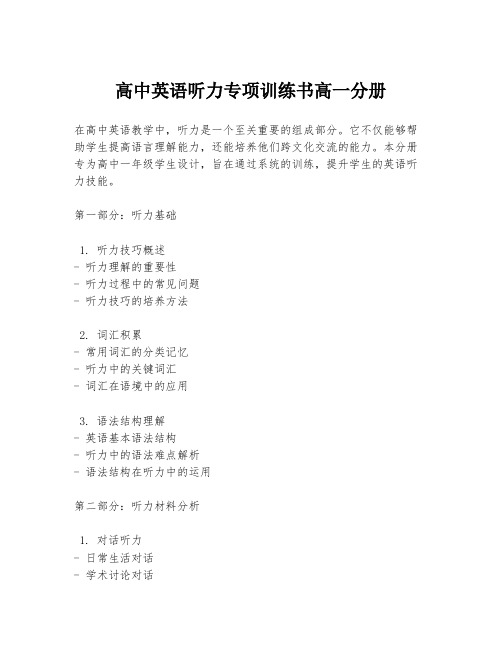
高中英语听力专项训练书高一分册在高中英语教学中,听力是一个至关重要的组成部分。
它不仅能够帮助学生提高语言理解能力,还能培养他们跨文化交流的能力。
本分册专为高中一年级学生设计,旨在通过系统的训练,提升学生的英语听力技能。
第一部分:听力基础1. 听力技巧概述- 听力理解的重要性- 听力过程中的常见问题- 听力技巧的培养方法2. 词汇积累- 常用词汇的分类记忆- 听力中的关键词汇- 词汇在语境中的应用3. 语法结构理解- 英语基本语法结构- 听力中的语法难点解析- 语法结构在听力中的运用第二部分:听力材料分析1. 对话听力- 日常生活对话- 学术讨论对话- 对话中的信息提取技巧2. 短文听力- 新闻报道- 故事叙述- 短文听力的要点捕捉3. 长对话与讲座- 学术讲座- 会议讨论- 长对话的逻辑结构分析第三部分:听力练习1. 基础听力练习- 词汇听力练习- 语法听力练习- 简单对话听力练习2. 进阶听力练习- 复杂对话听力练习- 新闻报道听力练习- 故事叙述听力练习3. 高级听力练习- 学术讲座听力练习- 会议讨论听力练习- 长对话听力练习第四部分:听力策略1. 预测与推断- 预测听力材料的主要内容- 推断听力材料中的隐含信息2. 笔记技巧- 听力过程中的笔记方法- 如何有效记录关键信息3. 应对策略- 面对听力难题的应对方法- 听力考试中的策略运用第五部分:听力模拟测试1. 模拟测试一- 对话听力模拟- 短文听力模拟- 长对话与讲座听力模拟2. 模拟测试二- 真实场景对话听力模拟- 新闻报道与故事叙述听力模拟- 学术讲座与会议讨论听力模拟3. 模拟测试三- 综合听力模拟- 听力材料的深度分析- 听力技巧的综合运用第六部分:听力资源与工具1. 听力资源推荐- 推荐听力网站与应用程序- 推荐听力书籍与材料2. 听力工具使用- 听力软件的基本操作- 听力工具在练习中的应用3. 听力习惯培养- 每日听力练习计划- 长期听力训练的重要性结语通过本分册的系统训练,学生将能够逐步提高英语听力能力,增强对英语语言的理解力和应用力。
高中英语专项集训高一上册
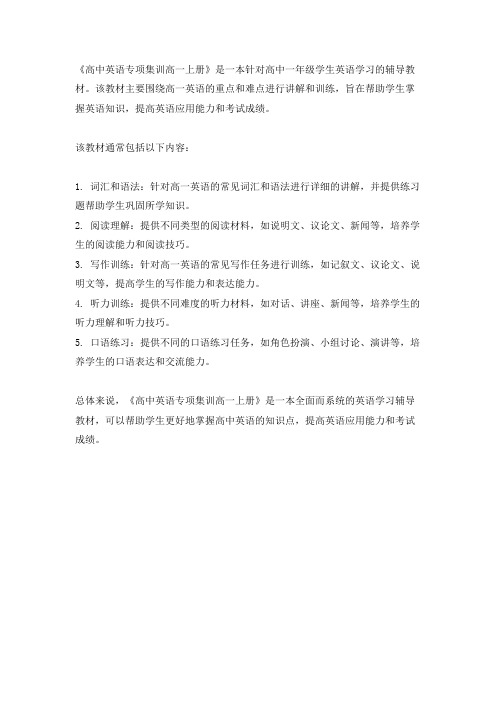
《高中英语专项集训高一上册》是一本针对高中一年级学生英语学习的辅导教材。
该教材主要围绕高一英语的重点和难点进行讲解和训练,旨在帮助学生掌握英语知识,提高英语应用能力和考试成绩。
该教材通常包括以下内容:
1. 词汇和语法:针对高一英语的常见词汇和语法进行详细的讲解,并提供练习题帮助学生巩固所学知识。
2. 阅读理解:提供不同类型的阅读材料,如说明文、议论文、新闻等,培养学生的阅读能力和阅读技巧。
3. 写作训练:针对高一英语的常见写作任务进行训练,如记叙文、议论文、说明文等,提高学生的写作能力和表达能力。
4. 听力训练:提供不同难度的听力材料,如对话、讲座、新闻等,培养学生的听力理解和听力技巧。
5. 口语练习:提供不同的口语练习任务,如角色扮演、小组讨论、演讲等,培养学生的口语表达和交流能力。
总体来说,《高中英语专项集训高一上册》是一本全面而系统的英语学习辅导教材,可以帮助学生更好地掌握高中英语的知识点,提高英语应用能力和考试成绩。
[必刷题]2024高一英语上册写作能力提升专项专题训练(含答案)
![[必刷题]2024高一英语上册写作能力提升专项专题训练(含答案)](https://img.taocdn.com/s3/m/ccd7f479580102020740be1e650e52ea5518ce21.png)
[必刷题]2024高一英语上册写作能力提升专项专题训练(含答案)试题部分一、选择题:10道1. 在英语写作中,以下哪个词组最适合用来表达“随着科技的发展”?A. With the development of technologyB. With the technology developingC. As the technology developsD. The technology develops2. 以下哪个句子使用了正确的比较级形式?A. He is taller than any other student in our class.B. She is more intelligent than her sister.C. The book is more interesting than that one.D. This puter is more expensive than that one.3. 在英语写作中,以下哪个词组可以用来引出原因?A. Because ofB. In order toC. As a result ofD. Due to4. 以下哪个句子使用了正确的倒装句结构?A. Only after he finished his homework did he go out.B. Never have I seen such a beautiful sight.C. Scarcely had she arrived when it started to rain.D. Not only did he speak English well, but also he wrote it fluently.5. 以下哪个句子使用了正确的强调句型?A. It is because of his hard work that he succeeded.B. It is him who is going to the party.C. It is the teacher who helped me a lot.D. It is a book that I bought yesterday.6. 在英语写作中,以下哪个词组可以用来表示“尽管”?A. DespiteB. In spite ofC. Because ofD. Instead of7. 以下哪个句子使用了正确的虚拟语气?A. If I were you, I would accept the offer.B. If I had known the truth, I would have told you.C. If it were to rain tomorrow, we would cancel the trip.D. All of the above8. 以下哪个句子使用了正确的被动语态?A. The window was broken the boy.B. The cake was eaten the children.C. The letter was written her.D. All of the above9. 在英语写作中,以下哪个词组可以用来表示“”?A. In conclusionB. To sum upC. In briefD. All of the above10. 以下哪个句子使用了正确的同位语从句?A. The fact that he didn't tell the truth disappointed us.B. The news that our team had won the game excited us.C. The rumor that the pany would go bankrupt worried the employees.D. All of the above二、判断题:5道1. 在英语写作中,使用过渡词可以增强文章的连贯性。
高一英语口语表达能力训练单选题20题

高一英语口语表达能力训练单选题20题1. —Hello! This is Tom speaking. May I speak to Jack?—Sorry, he isn't in. Can I take a message?A. That's all right.B. No problem.C. Sure.D. Thanks.答案:C。
本题考查日常交际用语。
“Sure.”表示“当然可以”,符合语境。
A 选项“That's all right.”通常用于回答道歉或感谢;B 选项“No problem.”一般用于表示同意或回应请求,但在这里不如“Sure.”更符合语境;D 选项“Thanks.”用于表示感谢,不符合题意。
本题涉及的口语表达规则是在接到让帮忙传话的请求时,用“Sure.”表示同意是比较常见的表达方式。
2. —I'm sorry I broke your pen.—It doesn't matter. I have another one.A. That's right.B. Never mind.C. You're welcome.D. Don't say so.答案:B。
“Never mind.”表示“没关系”,常用于回应别人的道歉。
A 选项“That's right.”表示“那是对的”;C 选项“You're welcome.”用于回应感谢;D 选项“Don't say so.”不太符合英语的习惯表达。
本题涉及的口语表达规则是回应道歉用“Never mind.”比较恰当。
3. —Your new dress is very beautiful!—Thank you!A. No, it isn't.B. Just so-so.C. I don't think so.D. Thanks.答案:D。
高一全国中学生英语能力竞赛阅读理解训练
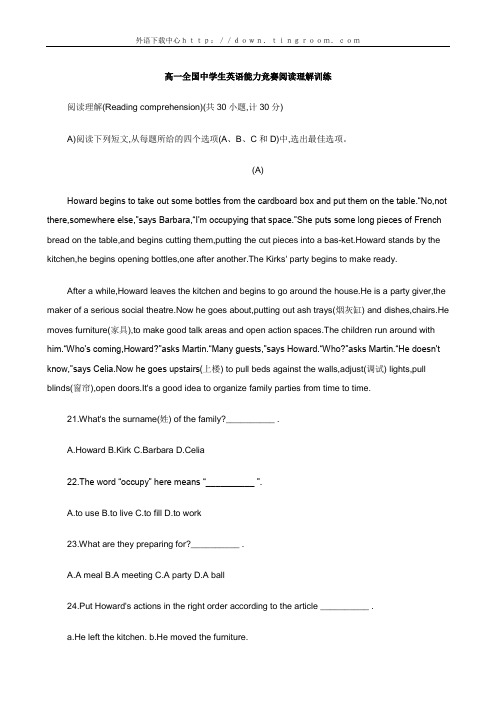
高一全国中学生英语能力竞赛阅读理解训练阅读理解(Reading comprehension)(共30小题,计30分)A)阅读下列短文,从每题所给的四个选项(A、B、C和D)中,选出最佳选项。
(A)Howard begins to take out some bottles from the cardboard box and put them on the table.“No,not there,somewhere else,”says Barbara,“I'm occupying that space.”She puts some long pieces of French bread on the table,and begins cutting them,putting the cut pieces into a bas-ket.Howard stands by the kitchen,he begins opening bottles,one after another.The Kirks' party begins to make ready.After a while,Howard leaves the kitchen and begins to go around the house.He is a party giver,the maker of a serious social theatre.Now he goes about,putting out ash trays(烟灰缸) and dishes,chairs.He moves furniture(家具),to make good talk areas and open action spaces.The children run around with him.“Who's coming,Howard?”asks Martin.“Many guests,”says Howard.“Who?”asks Martin.“He doesn't know,”says Celia.Now he goes upstairs(上楼) to pull beds against the walls,adjust(调试) lights,pull blinds(窗帘),open doors.It's a good idea to organize family parties from time to time.21.What's the surname(姓) of the family?__________ .A.HowardB.KirkC.BarbaraD.Celia22.The word “occupy” here means “__________ ”.A.to useB.to liveC.to fillD.to work23.What are they preparing for?__________ .A.A mealB.A meetingC.A partyD.A ball24.Put Howard's actions in the right order according to the article __________ .a.He left the kitchen.b.He moved the furniture.c.He opened the bottles.d.He spoke to the children.e.He made the rooms darker.f.He went upstairs.g.He opened doors.A.c,a,f,b,d,e,gB.a,f,b,d,g,e,cC.c,a,b,d,f,e,gD.b,c,a,g,f,e,d25.From the sentence:“Howard pulls beds against the walls,adjust lights,pull blinds,open doors”,what can we know?__________A.Howard takes parties seriously.B.Howard expects that some of his guests will sit and talk.C.Howard expects that some of his guests will dance.D.Howard is less interested in the guests than in what they do.(B)注释: 1.court:球场2.coach:训练3.length:长度4.tuition:讲授5.book:预定6.minimum:最小的7.skiing:滑雪8.slope:坡度9.instructor:指导者10.gymnastics:体操11.maximum:最大的26.This advertisement(广告) is taken from__________ .A.a piece of paper with informationB.a newspaperC.a card in a shop windowD.a poster in a college27.Which sport would be most suitable(适合) for a young married woman with a baby?She doesn't want too great exercises.A.Daytime tennis.B.Tuesday evening swimming.C.An afternoon golf lesson.D.Skiing at the weekend.28.Which day and time would be best for a family with two children aged 6 and 8,who all want tuition?A.Sunday afternoon._______B.Saturday morning.C.Friday evening.D.All day Saturday.29.If you want to practise golf,you must__________ .A.not be over nineB.practise in the daytimeC.make a bookingD.have nine lessons30.Which sport seems to be most suitable for young children under theage of 8?A.Golf.B.Swimming.C.Gymnastics.D.Skiing.B)阅读下列短文,然后回答问题或完成句子。
标准英语听力高一
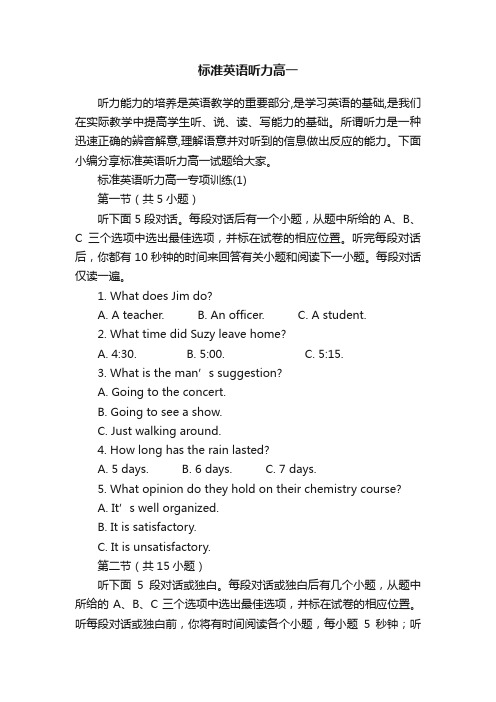
标准英语听力高一听力能力的培养是英语教学的重要部分,是学习英语的基础,是我们在实际教学中提高学生听、说、读、写能力的基础。
所谓听力是一种迅速正确的辨音解意,理解语意并对听到的信息做出反应的能力。
下面小编分享标准英语听力高一试题给大家。
标准英语听力高一专项训练(1)第一节(共5小题)听下面5段对话。
每段对话后有一个小题,从题中所给的A、B、C三个选项中选出最佳选项,并标在试卷的相应位置。
听完每段对话后,你都有10秒钟的时间来回答有关小题和阅读下一小题。
每段对话仅读一遍。
1. What does Jim do?A. A teacher.B. An officer.C. A student.2. What time did Suzy leave home?A. 4:30.B. 5:00.C. 5:15.3. What is the man’s suggestion?A. Going to the concert.B. Going to see a show.C. Just walking around.4. How long has the rain lasted?A. 5 days.B. 6 days.C. 7 days.5. What opinion do they hold on their chemistry course?A. It’s well organiz ed.B. It is satisfactory.C. It is unsatisfactory.第二节(共15小题)听下面5段对话或独白。
每段对话或独白后有几个小题,从题中所给的A、B、C三个选项中选出最佳选项,并标在试卷的相应位置。
听每段对话或独白前,你将有时间阅读各个小题,每小题5秒钟;听完后,各小题将给出5秒钟的作答时间。
每段对话或独白读两遍。
听第6段材料,回答第6至7题。
6. Where does this conversation take place?A. In a library.B. In a school.C. In a bookstore.7. Why is William Shakespeare mentioned in the conversation?A. He gave gifts to millions of people.B. He was a very wealthy man in his times.C. His signature is worth a lot of money.听第7段材料,回答第8至11题。
高一全国中学生英语能力竞赛听力训练
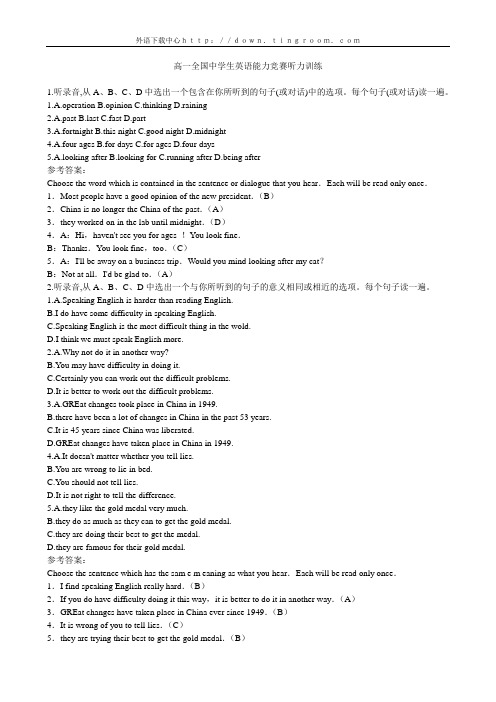
高一全国中学生英语能力竞赛听力训练1.听录音,从A、B、C、D中选出一个包含在你所听到的句子(或对话)中的选项。
每个句子(或对话)读一遍。
1.A.operation B.opinion C.thinking D.raining2.A.past st C.fast D.part3.A.fortnight B.this night C.good night D.midnight4.A.four ages B.for days C.for ages D.four days5.A.looking after B.looking for C.running after D.being after参考答案:Choose the word which is contained in the sentence or dialogue that you hear.Each will be read only once.1.Most people have a good opinion of the new president.(B)2.China is no longer the China of the past.(A)3.they worked on in the lab until midnight.(D)4.A:Hi,haven't see you for ages !You look fine.B:Thanks.You look fine,too.(C)5.A:I'll be away on a business trip.Would you mind looking after my cat?B:Not at all.I'd be glad to.(A)2.听录音,从A、B、C、D中选出一个与你所听到的句子的意义相同或相近的选项。
每个句子读一遍。
1.A.Speaking English is harder than reading English.B.I do have some difficulty in speaking English.C.Speaking English is the most difficult thing in the wold.D.I think we must speak English more.2.A.Why not do it in another way?B.You may have difficulty in doing it.C.Certainly you can work out the difficult problems.D.It is better to work out the difficult problems.3.A.GREat changes took place in China in 1949.B.there have been a lot of changes in China in the past 53 years.C.It is 45 years since China was liberated.D.GREat changes have taken place in China in 1949.4.A.It doesn't matter whether you tell lies.B.You are wrong to lie in bed.C.You should not tell lies.D.It is not right to tell the difference.5.A.they like the gold medal very much.B.they do as much as they can to get the gold medal.C.they are doing their best to get the medal.D.they are famous for their gold medal.参考答案:Choose the sentence which has the sam e m eaning as what you hear.Each will be read only once.1.I find speaking English really hard.(B)2.If you do have difficulty doing it this way,it is better to do it in another way.(A)3.GREat changes have taken place in China ever since 1949.(B)4.It is wrong of you to tell lies.(C)5.they are trying their best to get the gold medal.(B)3.听录音,在每小题中,你将听到一组对话以及一个问题。
高一七选五专题英语能力提升训练(含答案)

高一七选五专题英语能力提升训练(含答案)How to preserve the lockdown’s slower paceThe last 15 months of pandemic forced a slowdown in families’ often-crazed pace. Sports and after-school activities all disappeared in 2020. Now, communities reopen and calendars again fill with summer plans. ____1____ In a recent research, 31 percent of families said that they plan to take part in fewer after-school activities. Megan, a mother of two teenagers, learned how stressful a crowded schedule could be. Now, with less running around to sports and singing practices, both Megan and her children are enjoying the simple things in life. ____2________3____ In fact, all of us now have a unique opportunity to turn to what we care about and to be intentional about our time. To do so, make a list of the pros and cons of your life right now, and refer to that list as your calendar fills up. It’s important to identify and establish boundaries to help preserve the pros. ____4____When making your list of pros and cons, be specific about any of your daily interactions that were harmful, relationships that were unproductive, and the life patterns that made you unhappy. Ridding a harmful person of your life can be trickier than setting aside a hobby. ____5____ If the pandemic has been a welcome dismissal (摒弃) of these relationships, this moment is the best chance you might ever have to do so.A.The pandemic challenged parents everywhere.B.The chance to change attitudes isn’t just for parents.C.So set up reminders to reduce your schedule regularly.D.But we all have relationships that don’t benefit both sides.E.They spend time at the dining table and even outdoors together.F.Some parents are still determined to hold on to the relaxed pace.G.You should consider any people in your life who drag you down.If being late were an Olympic sport, some people would win medals. Being late can send a stressful ripple (连锁反应) through an entire day. ____6____.____7____It’s very important to be on time. Being on time shows respect for the person you’re meeting with. Punctuality also can be a reflection of how well you are respecting your own time and your own well-being. You can always let time pass, but you can’t get it back once it’s already gone. Know that departure time doesn’t equal arrival time____8____. So pack your bag, find your good shoes and get your travel mug ready all before you need to leave. Another tip is to work backward from when you need to be somewhere to give yourself time. There’s a lot of steps that people just don’t consider. So if you need to buy a metro card or print something, leave time for that stuff.Get comfortable with being earlyArriving somewhere early may make some people super-anxious, uneasy and extremely uncomfortable. ____9____. For example, you can try to tell yourself that you will in fact find something to do with your hands, or think of it as a moment to catch your breath and give yourself a second to get settled.Be honest about your latenessEveryone is late sometimes. ____10____. Either calling or texting is acceptable. By doing this, you can avoid unnecessary misunderstanding and handle the situations better.A.Think of being on time as a way of showing respectB.Be aware lateness often causes serious consequencesC.So here are some tips that can help you stop being lateD.It may sound simple, but it’s one of the hardest ones for peopleE.If you’re in the habit of being late, you need to learn to plan aheadF.In this case, you should learn to be comfortable with the passage of timeG.If you’re going to be late, the best thing you can do is communicating right awayFriendships can bring joy or sorrow. ____11____, we talked to researchers, authors, and therapists(治疗师) to learn how to manage the common relationship we all face.Broken promises(违背承诺)Friends are import ant for our physical and health but these relationships aren’t always smooth sailing. ____12____. And a major way this happens is through broken promises. Perhaps he canceled plans at the last minute or she refused to take part in an important party. ____13____, the first thing to do is remember that no one is perfect, says Jan Yager, PhD, friendship coach.____14____ “Sometimes jealousy(妒忌) shows our deepest desires,” says Dr. Yager. “Healthy envy(嫉妒) can motivate you to become better and be inspired by yo ur friend’s success,” she says. She points out that it could be the other way around as well: Your friends might be jealous of you. Feeling left outThere’s no worse feeling than when you check Facebook Monday morning to find out that your friends went on a weekend getaway without you. Scott Christnelly, a therapist, says, “I encourage clients to express their feelings about it but also not to jump to conclusions.” Then find someone else to talk to-maybe a family member, or a close friend (not one who went on the trip)-to explain how you feel. ____15____.A.Experiencing envyB.Friend breakups can be just as painful as a romantic brokeC.Since there’s no rule book on what to do when things get tense or go southD.But while it may be painfulE.In fact, it’s co mmon to experience some serious hurt from your friendsF.Stopping to feel jealous of themG.Maybe through that conversation, you can brainstorm how you will respondWhy Can’t People Stop Touching Museum Exhibits (展品)?When visiting the British Museum, you can see visitors touch ancient bowls even though the museum rules say no touching is allowed. Museum guards say it’s impossible to stop people from breaking the no-touch rule. ___16___Most museum-going is still a mainly visual (视觉的) experience for visitors to admire the artworks. ___17___ But over the past few years, more and more museums have been working to include additional senses, like sounds and smells. But touch, especially, is only allowed in certain areas, like the Louvre’s Touch Gallery, or the British Museum’s Hands On Desks.___18___ Before there were museums, there were curiosity rooms filled with a collection of interesting objects from around the world. When people visited the collection, the objects were passed around. Museums continued with this spirit of openness at first.But as museums grew, the spirit no longer existed. When you’ve got 4 million visitors a year, you can hardly have every body touching something. People are awkward and likely to damage the artworks. So the rule against touching artworks makes great sense. Smaller museums still sometimes encourage visitors to touch their objects. ___19___Why are we so unwilling to keep our hands to ourselves? Some people just want to make sure the artworks are real. But there’s a lar ger truth. ___20___ Visitors say that they want to feel how deep an engraving (雕刻) goes, so as to better understand the artistic skills. In this way, touching is part of trying to somehow make contact with the past.A.Touch was allowed in museums at first.B.It helps to show respect for the ancient artists.C.You stop 100 people touching and there are 200 more.D.Visitors learn more about objects from reading signs around.E.You can’t really learn more about objects unless you touch them.F.But the bigger ones prefer to advertise themselves as no touching.G.Museums have come a long way since the time of the curiosity room.How often have you thought: “When I lose this weight, I’ll be more confident and happy”? Yes, you might be, but often the effect is short-lived. You’re then looking for the next thing and the next. ____21____ And that starts with your mindset and becoming healthier and stronger physically and mentally at the same time.●Develop a healthy attitude towards yourself. Accept yourself as the unique individual you are today. Focus on your own journey, rather than waste time comparing yourself to others. Don’t be mean (刻薄的), critical or judgemental to anyone—including yourself!____22____●____23____ Be curious about how you honestly feel about y ourself, and try to go beyond “I don’t like my body”. Try closing your eyes and slowly focusing on each part of your body and see what thoughts, feelings and emotions arise. We often avoid thoughts’ that are uncomfortable or painful. ____24____ This isn’t about solving them, but exploring them might bring new insight and reduce their power.●Take action that works for you. ____25____ Building a personal toolkit (工具箱) of exercises to use when your thoughts are slipping to the negative will keep you on track to having a positive body image.The long-term change will come from the internal work you do. Remember that true beauty is much more than skin deep.A.Be kind, supportive and respect yourself.B.The trick is to work on your body confidence now.C.Explore your thoughts and feelings about your body.D.Instead, learn to observe them and how they make you feel.E.Write down three things you’re grateful to your body each day..F.Try to focus back on the present moments, whatever you are doing,G.It may require a bit of time to find what works for you, but it’s worth it.How to Get Mental PeaceAre you struggling with mental health these days, like feeling anxious or confused about your life? It may be difficult to find mental peace at first, ___26___. Here are the tips.Find meanings in your life. ___27___. For example, you can connect with others through voluntary work or finding other ways to help and serve others, such as taking care of you families. If you feel fulfilled with your contribution, your mind will be more peaceful.Start a journal. You can write your thoughts and feelings about your past and current life. So it is an effective way to find out what might be keeping you from peace. In this way, it helps you find out if you still suffer because of events from your past. ___28___.___29___. Everyone complains about things, but someone does this as a normal pattern. That may be draining your energy or negatively influencing your mood. You may need to be careful about the amount of time you spend with them. Try to spend more time with people who lift you up.Being Mindfulness. Your mental peace can be disrupted by worrying about the future or being stuck in the past, ___30___. Mindfulness can help produce a sense of calm, manage your emotions, and adapt to stressful situations at this moment.A.Pay attention to the influence of othersB.Support your passive and anxious friendsC.but you can practice techniques to help yourselfD.That will analyse what make your life successfulE.so you’d better bring your awareness to the presentF.Ask yourself if the things you do bring joy and value to youG.It also helps you think about what keeps you happy at presentSometimes we make meditation(冥想) more complicated than it needs to be. Instead of over thinking it, follow the steps below to set yourself up for success:● Find Your MotivationAs with any new habit, it's important to understand your motivation for getting started. I meditate because I feel like it makes me a calmer person during the day. ___31___ Whatever your motivation is, get clear on it and come back to it often.● Choose Your ToolsWhen you have the right tools, meditation can feel a lot less daunting. I find guided meditations a lot easier to follow than trying to meditate in silence, but everyone has their own preferences.___32___ , I recommend Calm, Head space, and Insight Timer.● Create a Meditation SpaceAlthough you can practice meditation anywhere, I find it helpful to have a designated meditation space that feels familiar to you. ___33___ You might prefer to lay out a yoga mat in your living room or sit on some pillows in a quiet corner. Find what works for you!● ___34___If you want to start making meditation part of your routine, it's important to carve out time for it. I've found that the only way I can get myself to do it every day is to open up my Calm ape rightafter I wake up. When meditation is the first thing I do, I start my day feeling less anxious.● Track Your ProgressBoth Calm and Head space have built-in trackers that show you how many days you've meditated in a row, and I find this motivating because I never want to break my steak. ___35___ you could simply keep track of it in your daily to-do list.A.Set a Fixed TimeB.Set a Time LimitC.I choose to meditate upright in bedD.If you're not using either of these appsE.If you're looking for a good meditation appF.Perhaps you want to meditate to reduce anxietyG.If you try meditating for the first time with 20 minutesThere was a survey of the people who were born from 1980 to 2000, asking them what their most important life goals were. Over 80 percent said it was to get rich. ___36___ We're constantly told to devote more to our work, to push harder and to achieve more. We're given the impression that these are the things that we need to go after to have a good life. But is that the truth ___37___But what if we could study people from the time when they were teenagers all the way into old age to see what really keeps people happy and healthy? The Harvard Study of Adult Development did it. For 75 years, they've tracked the lives of 724 men. Studies like this are extremely rare. Almost all projects of this kind fall apart within a decade because too many people drop out of the study.___38___ Or the researchers can't get together. But through a combination of luck and the persistence of several generations of researchers, this study has survived.So what have they learned The conclusion is that it's not wealth or fame that counts.___39___ They've learned three big lessons about relationships. Firstly, people who are more socially connected to family, to friends and to community are happier and physically healthier. The second is that it's not just the number of friends you have but the quality of your close relationships that matters. And the third is that good relationships don't just protect our bodies.___40___A.They can even protect our brains.B.To become famous came second.C.Or funding for the research dries up.D.The good life is built with relationships.E.It turns out that being in conflict is bad for our health.F.It is good relationships that keep us happier and healthier.G.To be frank, sometimes wealth and fame can make people happy.Looking back on my application process, I summarize the things that helped me when applying to Harvard. So continue reading for my top tips!1. Be yourself.I followed many “dos and don’ts” at first. However, once I started writing more authentically about myself, I was able to write a better essay. In fact, every part of the application is an opportunity for you to paint a picture for the admissions committee. What matters to you? What do you like to study? What motivates you? What kind of student are you? What responsibilities would you take on in college? ____41____2. Start early.____42____ At this time, you have multiple tasks to handle and completing each application requirement will take time. For example, securing a good recommendation letter will be easier if you ask your teachers a month before they are due than if you ask them a few days before a deadline. You must also request transcripts, edit and revise your essays, and keep attending and doing well in your classes! How can you accomplish so many tasks? ____43____3. ____44____While you won’t be able to review s ome elements of your application, like your letters of recommendation, you should sill reflect on what you think your teachers will highlight about you. ____45____ For example, in your personal statement, you might have highlighted one of your life experiences that has shaped you greatly. Is your transcript missing an academic passion that has been significant to you? Where else can you share it? Mapping these experiences and strengths onto different parts of your application is a good strategy, because it helps maximize the often limited word counts of your application.A.Make a map.B.Select your experiences.C.This is especially important during your senior year!D.So see the application as a chance to show who you are.E.Therefore provide impressive materials to convince them.F.I suggest setting concrete goals to accomplish every week.G.Similarly, think about what you’ll say in each part of your application.Ways to have a happy school lifeYour schooldays should be some of the best and happiest days of your life. How can you gain(收获) the most from them, and ensure you do not waste this wonderful opportunity to learn?___46___ Don't say things are difficult or boring. Be interested in school-life and your school subjects. Join in lots of activities. Go round the school with a big smile.Expect to work. School is not a holiday camp. If you are not working, you are wasting your time at school. Teachers cannot make everything enjoyable.Keep fit. If you do not eat a good breakfast, you will be thinking about food in class. If you go to bed late and do not have enough sleep, you will be sleepy in class. ___47___Never put off till tomorrow what you can do today. _____48_____ If you get behind the class. it is very difficult to get back in front. You cannot finish a race if you rest all the time.___49___ Everyone will fail in some tests, lose some matches and have bad days. Don't make small problems seem very big and important.Set study targets. If your last grade was a D, work for a C.____50____ Think of small targets: "l will speak in class four times this week." or "I will get two more marks this week."Follow my advice and have a happy school life!A.No pains no gains.B.Be positive about school.C.Try to make progress bit by bit.D.We are expected to get a perfect score.E.Do not say you will do things tomorrow.F.Play some sports to keep your body strong.G.Don't be too disappointed if things sometimes go badly.【参考答案】***试卷处理标记,请不要删除1.无1、F牝2、E牝3、B牝4、C牝5、D【导语】本文是一篇记叙文。
高一英语阅读理解推理判断题专项训练单选题20题
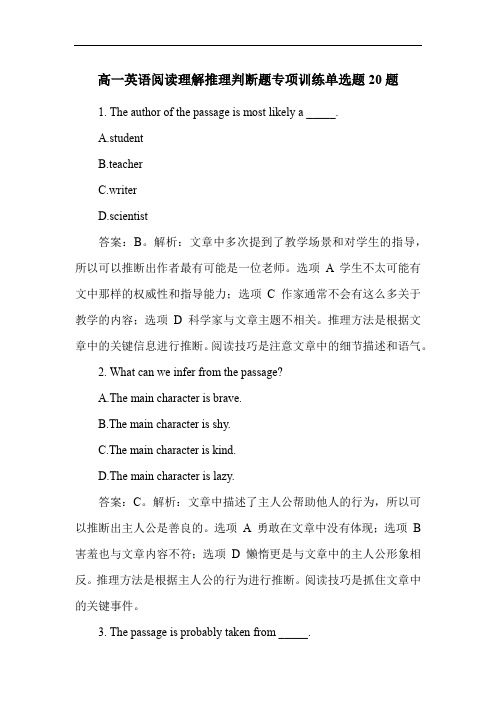
高一英语阅读理解推理判断题专项训练单选题20题1. The author of the passage is most likely a _____.A.studentB.teacherC.writerD.scientist答案:B。
解析:文章中多次提到了教学场景和对学生的指导,所以可以推断出作者最有可能是一位老师。
选项A 学生不太可能有文中那样的权威性和指导能力;选项C 作家通常不会有这么多关于教学的内容;选项D 科学家与文章主题不相关。
推理方法是根据文章中的关键信息进行推断。
阅读技巧是注意文章中的细节描述和语气。
2. What can we infer from the passage?A.The main character is brave.B.The main character is shy.C.The main character is kind.D.The main character is lazy.答案:C。
解析:文章中描述了主人公帮助他人的行为,所以可以推断出主人公是善良的。
选项A 勇敢在文章中没有体现;选项B 害羞也与文章内容不符;选项D 懒惰更是与文章中的主人公形象相反。
推理方法是根据主人公的行为进行推断。
阅读技巧是抓住文章中的关键事件。
3. The passage is probably taken from _____.A.a novelB.a newspaperC.a textbookD.a magazine答案:C。
解析:文章的语言和内容具有教育性,更像是来自教科书。
选项A 小说通常有更复杂的情节和文学性的语言;选项B 报纸的文章通常更注重时效性;选项D 杂志的内容比较广泛,但不一定有这么强的教育性。
推理方法是根据文章的风格和内容进行推断。
阅读技巧是分析文章的特点。
4. What is the main idea of the passage?A.A trip to a beautiful place.B.A story about friendship.C.A lesson about life.D.An introduction to a famous person.答案:B。
高一英语词汇专项训练

高一英语词汇专项训练一、单词拼写。
1. 根据汉语提示写出单词并标注发音和词性。
- 题目:“首都;省会”(n.)- 答案:capital [ˈkæpɪtl](名词)- 题目:“令人钦佩的;极好的”(adj.)- 答案:admirable [ˈædmərəbl](形容词)- 题目:“态度;看法”(n.)- 答案:attitude [ˈætɪtjuːd](名词)- 题目:“行为;举止”(n.)- 答案:behaviour [bɪˈheɪvjə(r)](名词)- 题目:“挑战;质疑”(vt. & n.)- 答案:challenge [ˈtʃælɪndʒ](动词兼名词)2. 根据英语释义写出单词并标注发音和词性。
- 题目:a person who is in charge of a school(n.)- 答案:headmaster [ˌhedˈmɑːstə(r)](名词)- 题目:a building where people go to worship(n.)- 答案:church [tʃɜːtʃ](名词)- 题目:to give an opinion about something(vt.)- 答案:comment [ˈkɒment](动词)- 题目:to make something better(vt.)- 答案:improve [ɪmˈpruːv](动词)- 题目:a feeling of great pleasure(n.)- 答案:joy [dʒɔɪ](名词)二、单词变形。
1. 写出下列单词的形容词形式并标注发音和词性。
- 题目:success(n.)- 答案:successful [səkˈsesfl](形容词)- 题目:care(n.)- 答案:careful [ˈkeəfl](形容词)- 题目:help(n.)- 答案:helpful [ˈhelpfl](形容词)- 题目:use(n.)- 答案:useful [ˈjuːsfl](形容词)- 题目:power(n.)- 答案:powerful [ˈpaʊəfl](形容词)2. 写出下列单词的名词形式并标注发音和词性。
(英语)高一英语阅读理解专题训练答案及解析
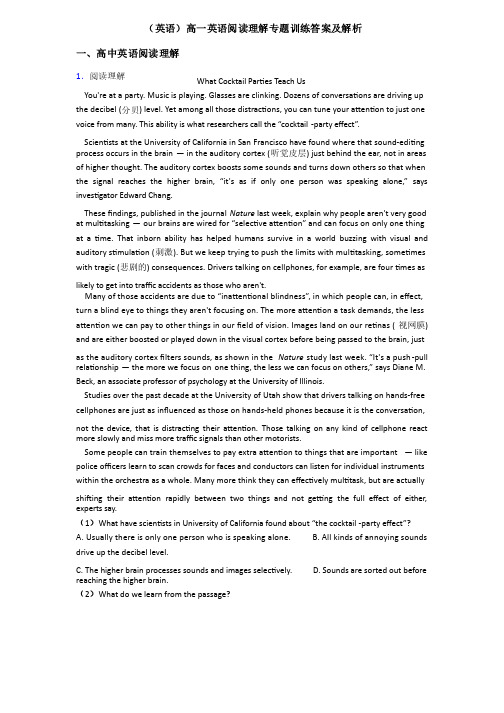
the decibel (分贝) level. Yet among all those distrac ons, you can tune your a en on to just one
voice from many. This ability is what researchers call the “cocktail -party effect”.
not the device, that is distrac ng their a en on. Those talking on any kind of cellphone react more slowly and miss more traffic signals than other motorists.
These findings, published in the journal Nature last week, explain why people aren't very good at mul tasking — our brains are wired for “selec ve a en on” and can focus on only one thing at a me. That inborn ability has helped humans survive in a world buzzing with visual and auditory s mula on (刺激). But we keep trying to push the limits with mul tasking, some mes
accident because of phubbiБайду номын сангаасg(低头).
(4)The main purpose of the passage is to ______.
高一英语学生能力自主强化训练参考答案
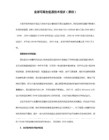
No.13: ABDBD CCDAD DACCD
No.14: CDCDD BDDAC AACBD
No.15: CABBB BBACD AAACB
No.16: BADCA BCBBC BDACD
No.17: ADDBB ACDBD ADCDA
No.7: ACCBB ACADB DABBC
No.8: CBCCC ABADA BBDAC
No.9: ACADC DBBDC DBBAA
No.10: CAABC ACDBB DACBC
No.11: BCBAD DCAAC DCCAD
No.12: BDDDC ACDDA BBCDC
No.2: ABCAB CDBDB DCCBC BBBAC
No.3: AACAB DADBB ABDBC DDCAA
No.4: BBACC DADAC BCCAD BDBAC
No.5: ABBCA BDBAC DBADC CABDA
No.6: BDDCA DCBAD ABCBA ACBCD
No.13: CBBCB CDABA DCCBC
No.14: CABAD ADBBC DDDDC
No.15: BDCAC DBCAD ABCAB
No.16: ADDBB DDCAC BBACA
第四部分 书面表达
No.1: was born in 1452 in Vinci, Italy; His father was a wealthy notary and his mother was a peasant; At the age of 15, he began to learn painting and formed his own style in the middle of the 1470s; From 1495 to 1497 he finished his masterpiece The Last Supper; and it was during the period between 1503 and 1506 that he created the famous Mona Lisa; Besides being a painter, Leonardo da Vinci was also a sculptor, an architect, an engineer and a scientist; He carried out a lot of scientific studies and made great contributions in many fields;
高中英语听力满分攻略高一强化训练

高中英语听力满分攻略高一强化训练
以下是高中英语听力满分攻略高一强化训练的建议:
建立听力素材库
为了提供丰富多样的听力素材,可以收集一些有趣的英语听力资源,如TED演讲、BBC新闻和电影等。
可以在YouTube上寻找适合自己水平的材料,并使用字幕和注释,帮助理解和记忆重要单词和短语。
提高听力技巧
在听取素材时,不能仅仅关注听力材料的内容,还需要注意一些技巧,如语速、重音、节奏和停顿等。
可以多进行模仿练习,提高对英语语调和语音的敏感度。
练习听力题型
高中英语听力常见的题型包括选择题、填空题、匹配题和听写等。
可以针对不同的题
型进行针对性的训练,如选择题要注意听取关键信息,填空题要注意听取适当的语调
和语音特征,匹配题要注意对比听取两个人之间的差异,听写则需提高对英语单词和
短语的识别和记忆能力。
增加听力机会
除了听力练习,增加听力机会也非常有帮助。
可以参加英语角活动,与其他学习英语
的人交流;或者在外教授课时,多倾听讲师的讲解,提高自己的听力水平。
注重细节处理
完成听力考试的时候,需要注意细节处理能力。
如果遇到听不清或者听不懂的问题,不要慌张,适当重复听几次或者利用上下文推测。
同时,也要注意书写清晰、标点符号正确,以免因为笔记有误导致答案错误。
通过以上的方法进行听力强化练习,相信可以从容面对英语听力考试,取得优异的成绩。
天津市静海区2022-2023学年高一下学期3月学业能力调研英语试题含解析

___________________________________________________________________________
2. What reasons do you think make movie adaptations less satisfactory than the original books? (Book2Unit4)
【解析】
【6题详解】
考查非谓语动词。句意:在舞台上唱歌的男孩是汤姆。句子的谓语为is,sing作非谓语动词,与逻辑主语The boy之间为主动关系,应用现在分词,作后置定语。故将sing改为singing。
【7题详解】
考查形容词。句意:在会上,我对计划作了简短介绍。修饰名词introduction,应用形容词,作前置定语。故将briefly改为brief。
【答案】balance##alance
【解析】
【详解】考查名词。句意:你看起来很沮丧。你应该在工作和娱乐之间保持平衡。此处考查动词短语keep a balance between...and...,意为“在……和……之间保持平衡”,设空处应填名词balance,作keep的宾语。故填balance。
【8题详解】
考查名词。句意:他以勇气和决心与病魔作斗争。with后接名词,作宾语,故将determine改为determination。
【9题详解】
考查形容词。句意:她对工作很挑剔,没有人愿意为她工作。be动词后接形容词,作表语,此处考查短语be particular about,意为“讲究,挑剔,对于……很认真”,故将particularly改为particular。
- 1、下载文档前请自行甄别文档内容的完整性,平台不提供额外的编辑、内容补充、找答案等附加服务。
- 2、"仅部分预览"的文档,不可在线预览部分如存在完整性等问题,可反馈申请退款(可完整预览的文档不适用该条件!)。
- 3、如文档侵犯您的权益,请联系客服反馈,我们会尽快为您处理(人工客服工作时间:9:00-18:30)。
高一英语能力训练18第一节完形填空(共20小题;每小题1.5分,满分30分)Several weeks ago, my friend offered to sell some of our things for us. I thought it was a good chance to 41 my 7-year-old son’s room and 42 some toys that were no longer suitable for him to play with. We 43 that all the money we got from selling the toys would be his money.The night before the 44 , we loaded up the truck with toys and a little bike that was too 45 for him. In the yard he 46 the bike for the last time and then happily put it onto the truck. 47 this little bike had at least two previous owners, i t wasn’t in the best 48 and was certainly not new, but the tyres (车胎) were 49 good.We put a price of $10 on it, but it didn’t sell. So, after the sale was 50, my friend put it on the sidewalk with a sign that 51 “ FREE BIKE”. Within five minutes her doorbell rang. A little boy was 52 there. In poor English he asked whether the bike was 53 free. She said yes and that he could have it for 54 . He smiled, got on the bike and rode away.Later that evening when I told my son how much money he had made at the sale, he was very 55 , shouting happily. He asked about a few of his things, wondering 56 they had been sold. When he asked about the bike, I told him about the little boy and that made him 57 . He was much happier than when I told him how much he had 58 . He was so happy to 59 that someone else would make good 60 of that little bike!41. A. check B. clean C. build D. display42. A. look for B. go over C. deal with D. show around43. A. agreed B. refused C. wrote D. lied44. A. sale B. show C. trip D. decision45. A. weak B. thin C. new D. small46. A. watched B. found C. rode D. designed47. A. So B. And C. But D. As48. A. shape B. chance C. place D. time49. A. also B. still C. never D. hardly50. A. ahead B. on C. over D. near51. A. repeated B. said C. copied D. expressed52. A. jumping B. walking C. standing D. shouting53. A. really B. usually C. barely D. always54. A. something B. nothing C. everything D. anything55. A. calm B. scared C. disappointed D. excited56. A. when B. that C. why D. if57. A. worry B. smile C. leave D. cry58. A. enjoyed B. lost C. made D. bought59. A. understand B. think C. remember D. hear60. A. use B. money C. interest D. price第二节(共5小题;每小题2分,满分10分)Chinese culture values family bonds (纽带) very much. Family members don’t just gather during the holidays, in fact they often live under one roof all year round.Different cultures have different family values. 36In most East Asian cultures, extended families(大家庭) are common. 37 According to the Atlantic, 90 percent of children in Shanghai and 70 percent of children in Beijing were cared for by their grandparents. Chinese people believe that “a grandparent is a treasure to their family”.In many Western countries,most families are nuclear families (小家庭). These are only made up of children and their parents.Additionally, the duties parents have toward their children can also differ.38 It’s normal for parents to pay for their chi l dren’s college, help them find a job, or buy thema n apartment. Chinese adults also follow their parents’ opinions when making major life decisions, more often than not.In most Western countries, however, kids usually move out of the house after they turn 18. 39 Also, if they choose to keep living with their parents after becoming an adult, it can be seen by some as a failure on their part.While the East cares more about close family bonds, the West values privacy and independence.40 Families will always be a source of love, warmth, and care for people around the world.A. These families have three or even four generations living together.B. Nuclear families are the most common type in China.C. In China, many parents look after their children all the way into adulthood.D. Families in the east and west are very different from each other.E. But in the end, home is best — east or west.F. Many young people going to college often need to take out loans and work part-time jobs inorder to pay for tuition and rent.G. Both Easterners and Westerners value quality family time.第二节(共10小题:每小题1.5分,满分15分)阅读下面材料,在空白处填入适当的内容(1个单词)或括号内单词的正确形式。
I like traveling. I 61 (travel) to many places since I went to college,and my travel to Tibet impressed me 62 (deep). I took the train there with my friends and enjoyed the scenery all the way. When the train 63 (get) close to Tibet,I had a headache. Then I found 64 difficult to breathe and felt very tired. I knew that all my 65 (symptom) were called altitude(海拔) sickness. And it took me a few hours to get used to it. Tibet, 66 (know) as the “Roof of the World”, has 67 great many world-famous places of interest,including the model of Tibetan architecture, Potala Palace and Mount Everest. So when I felt a little 68 (well), I couldn’t wait to head towards them. I was surprised 69 (find) that the top of Mount Everest was covered with snow even in July and 70 the sun came out, it became pure and beautiful.第一节短文改错(共10小题;每小题1分,满分10分)The teacher I like best is Mr. Chen, my math teacher. He is 35 years old and very thin, that always wears a pair of glasses. I loved Mr. Chen for the following reasons. First, he does well in teaching the math and always tries different ways to make his teaching interested. Besides, he is strict with us students, expected us to try our best whatever we do. More important,he encourages us to explore problems on our own instead telling us the answers. As a result, we make rapid progresses in our math with her kind help.Mr. Chen is so a good teacher that we all admire him.雅安市2019—2020学年下期期末检测高中一年级英语试题参考答案21—25 BCDAD 26—30 BDABC 31—35 AACBD 36—40 DACFE41—45 BCAAD 46—50 CDABC 51—55 BCABD 56—60 DBCDA61.have travel(l)ed 62. deeply 63. got 64. it 65. symptoms66. known 67. a 68. better 69. to find 70. when/ asThe teacher I like best is Mr. Chen, my math teacher. He is 35 years old and very thin, that alwayswho wears a pair of glasses. I loved Mr. Chen for the following reasons. First, he does well in teachinglovethe math and always tries different ways to make his teaching interested. Besides, he is strict with 去掉interestingus students, expected us to try our best whatever we do. More important,he encourages us to expecting importantlyexplore problems on our own instead ^ telling us the answers. As a result, we make rapidofprogresses in our math with her kind help.progress hisMr. Chen is so a good teacher that we all admire him.suchDay 18【常考话题句式】网络时代1.Personally, I don’t like shopping online because we may be cheated online.就我个人而言,我不喜欢网上购物,因为有可能受骗。
